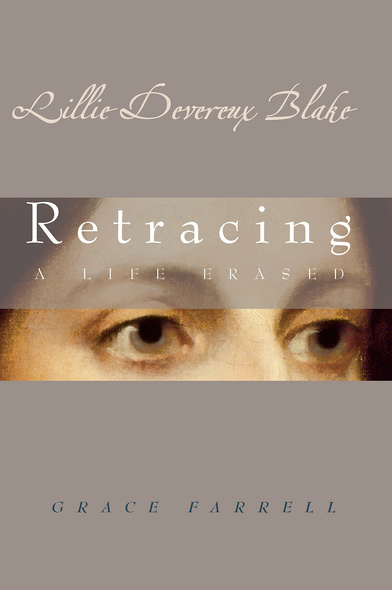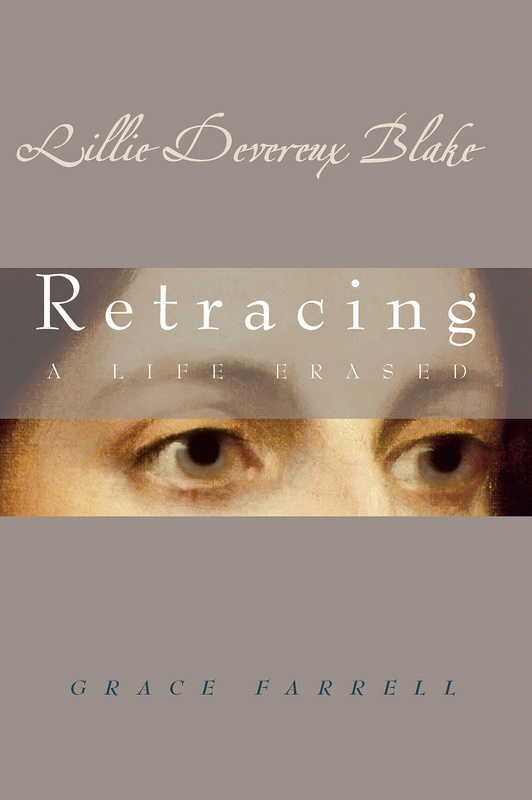Our shopping cart is currently down. To place an order, please contact our distributor, UTP Distribution, directly at utpbooks@utpress.utoronto.ca.
Fiction writer, journalist, and essayist, Lillie Devereux Blake (1833–1913) published seven novels, two collections of stories and essays, and hundreds of other pieces during her lifetime. She also played a major role in the struggle for women's rights, eventually becoming Elizabeth Cady Stanton's candidate to succeed Susan B. Anthony as president of the National American Woman Suffrage Association.
Yet for all her remarkable accomplishments, Lillie Blake's story has been all but forgotten. As Grace Farrell reveals in this richly textured biography, Blake's creative writings did not survive the canonical purges of women authors at the turn of the twentieth century, and her contributions to the suffrage movement were simply ignored in the official histories sanctioned by Susan B. Anthony. From the traces that remain, Farrell reconstructs an extraordinary life of passion and purpose. She chronicles Blake's literary career from Civil War correspondent to novelist and provides an inside view of suffrage politics, correcting some long held misconceptions perpetuated by Anthony and her supporters.
At the same time, Farrell expands the generic boundaries of biography by recounting not only a life and the causes of its erasure but also her own process of recovering that life. She brings the reader along with her as she follows Blake's path in the world, touches her diary, reads her letters, and campaigns to prevent Yale University from demolishing Blake's childhood home in New Haven.
Yet for all her remarkable accomplishments, Lillie Blake's story has been all but forgotten. As Grace Farrell reveals in this richly textured biography, Blake's creative writings did not survive the canonical purges of women authors at the turn of the twentieth century, and her contributions to the suffrage movement were simply ignored in the official histories sanctioned by Susan B. Anthony. From the traces that remain, Farrell reconstructs an extraordinary life of passion and purpose. She chronicles Blake's literary career from Civil War correspondent to novelist and provides an inside view of suffrage politics, correcting some long held misconceptions perpetuated by Anthony and her supporters.
At the same time, Farrell expands the generic boundaries of biography by recounting not only a life and the causes of its erasure but also her own process of recovering that life. She brings the reader along with her as she follows Blake's path in the world, touches her diary, reads her letters, and campaigns to prevent Yale University from demolishing Blake's childhood home in New Haven.
Reads like a detective story, full of suspense and intrigue. Well-written, evocative, and carefully researched, the narrative of Blake's struggles and successes unfolds through the inquisitive lens of her biographer; the very process of uncovering Blake's significance in the world of nineteenth-century women's politics and literature becomes part of the story.'—Leah Blatt Glasser, author of In a Closet Hidden: The Life and Works of Mary Wilkins Freeman
'One of the most impressive biographies I've read. The strengths of Farrell's book lie not only in its theorization and framing of Blake's life, but in its command of cultural history and in her superb close readings of literary texts.'—Carolyn L. Karcher, author of The First Woman in the Republic: A Cultural Biography of Lydia Maria Child
'Blake is certainly one of the most important of the recently recovered women writers of the nineteenth century. In this beautifully written and insightful biography, Farrell advances our understanding of Blake's importance by culturally contextualizing her life and writings in complex and fascinating ways. As a Civil War journalist, renowned novelist, ardent advocate of women's suffrage, and articulate lecturer in support of the labor movement, Blake gives us significant insights into the major political and social movements of the period. This is a book I simply could not put down. It is a model of scholarship and a must-read for anyone interested in nineteenth-century studies.'—Sharon M. Harris, author of Rebecca Harding Davis and American Realism
'[Farrell] here presents an engaging critical biography, the first in 60 years. She skillfully describes Blake's accomplishments against the background of her struggles with prevailing social attitudes. Farrell's own experiences in researching the book offer additional perspective on Blake's life.'—Library Journal
'Almost forgotten today, Blake (1833-1913) was a successful author, journalist, and public speaker prominent in the women's rights movement and instrumental in the founding of Barnard College. Fiercely independent and unwilling to be confined by the gender constraints of her day, Blake supported herself and her children by writing and lecturing and campaigned tirelessly for the legal and social equality of women. Her wider vision of women's rights put her at odds with women seeking only women's suffrage. As a result, she has been marginalized in the history of the women's suffrage movement. Farrell (English, Butler Univ.), who has edited a new edition of Blake's novel, Fettered for Life, here presents an engaging critical biography, the first in 60 years. She skillfully describes Blake's accomplishments against the background of her struggles with prevailing social attitudes. Farrell's own experiences in researching the book offer additional perspective on Blake's life. Appropriate for academic and public libraries.'—Patricia A. Beaber, College of New Jersey
Grace Farrell is the Rebecca Clifton Reade Professor of English at Butler University. Among her published works is an edition of Lillie Devereux Blake's 1874 novel, Fettered for Life.






